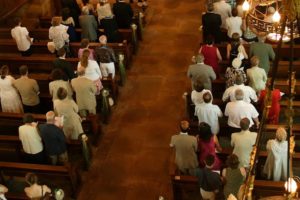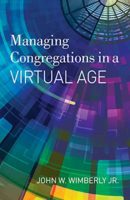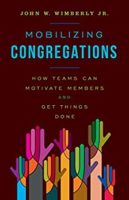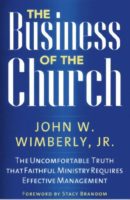
As I met with a governing board during a planning session, one member asked, “How are we ever going to develop a communications strategy without the appropriate staff?” I responded, “We won’t know what the appropriate staff is until we have a strategy. Don’t you have some members who work on communications and marketing in their day jobs?” “Of course! We have some people who are outstanding in that field,” came the reply. “Then why are we talking about this instead of having your members who have the skill sets and experience to do it?” Folks took my question as though it was a revelation. Actually it was common sense.
Laity have always been the heart of congregations’ lives. During the last part of the 20th and first part of the 21st centuries, they have been displaced in some congregations by staff. To be a “staff-driven congregation” is now widely viewed as a positive. While I hold congregational staff members in very high regard, in 2021 I think we need to rediscover lay-driven ministry. From their day jobs, lay people have skills and experience most congregations need: marketing and communications, modern financial systems, tech-driven building systems, team-based work, administrative systems, cloud-based systems, and so much more.
“I have been telling them for years”
I can’t count the number of times I have told a governing board their website is ill-designed as an evangelism and information tool only to have a member come up to me at a break and whisper, “Thank you. I design websites in my day job and have been telling them for years that we need to get up to speed. They listen but do nothing.” It is a classic example of a congregation not employing the skills and experience of its members. Why are clergy or staff with little knowledge about website design designing websites?
When hiring a secretary, why would clergy be the only ones interviewing candidates? I’d like to see the clergy surrounded by lay members who are either secretaries themselves or supervise secretaries. When hiring a religious educator, I’d like the clergy to be surrounded by professional educators. When hiring a bookkeeper, I’d like those hiring to have real-world knowledge of bookkeeping and if available, a certified public accountant or two.
Obviously, the smaller a congregation, the less likely the membership will have all the skills and experiences needed for ministry in the 21st century. But I’d like every congregation, regardless of size, to inventory of its members’ skills and work experience. By the way, in most congregations, this information doesn’t need to be stored in a database. (An interesting study would be to compare the number of hours spent developing and maintaining a congregation’s data base with how often it is accessed.) The smaller the congregation, the more aware members and staff should be of people’s day jobs. In a congregation with less than 300 in worship, I would expect the pastor(s) to know what all the members do in their work lives.
Unused gifts
As consultants, part of the value we add to congregations that hire us is the macro view we develop working around the country and across denominations. One of the more distressing macro-trends I see is that congregations fail to utilize their members’ gifts. Yes, members are incredibly generous with their time singing in the choir, ushering, teaching, organizing mission work, serving on teams, committees, and governing boards—and so much more. But we are not taking full advantage of the expertise our members have built up in the secular world.
At a time when congregations really need members to apply their secular-developed skills to ministries, we are blessed with a massive number of Boomers who are retiring. Pew Research reports that “In the third quarter of 2020, about 28.6 million Baby Boomers—those born between 1946 and 1964—reported that they were out of the labor force due to retirement.” That is 3 million more boomer retirees than at the same time in the prior year.
Lay-driven ministry
While it is true that many Boomers use retirement as an opportunity to travel or live part-time in other locations, it is also true that they remain in their hometowns for significant parts of the year. Retirees remain a major pool of volunteers for the congregations where they worship. There is no reason someone working on a congregation’s finances can’t do so remotely from wherever they are in the world. Blessed with skills and experience developed over a lifetime, they can use those skills for the benefit of their congregations.
Gen Xers are in the prime of their careers with amazing skills they could share with their congregations. Millennials, the largest generation numerically in the U.S., love to apply their secular skills to the nonprofits and congregations where they participate. Some of the most vibrant nonprofits are empowered by Millennials volunteering their skills. As one example, employing the knowledge of Millennials in the way a social media-driven world works is crucial for congregations seeking to elevate their voice. Indeed, Millennials are far more likely to stick with a congregation if they are asked to do meaningful work than if they are given tasks they deem meaning-less. And rather than having Boomers sit around and speculate about how to attract Millennials to congregations, how about asking Millennials to tell us and then lead us!
Many congregations like to say, “All members are ministers.” In practice, I find that not to be the case. Let’s empower lay people to do in their congregations what they do all week at work—develop communications and marketing systems, manage complex facilities, create transparent financial systems, generate video content for educational programs, etc.
Need an upgrade to various areas of your ministry? Your lay people can provide it! May the 21st century become known as a lay-driven century of congregational life.
John Wimberly is an experienced pastor and consultant. As a consultant, he has worked with congregations and judicatories on strategic planning, staff designs for the 21st century, and congregational growth as well as financial and administrative management. He has MBA, MDiv, and PhD (theology) degrees. His books focus on effective management and leadership. John believes congregations can have a bright future!



